Offering to make a difference
Updated: 2014-03-20 07:41
By Alfred Romann and Kristine Yang (China Daily)
|
||||||||
|
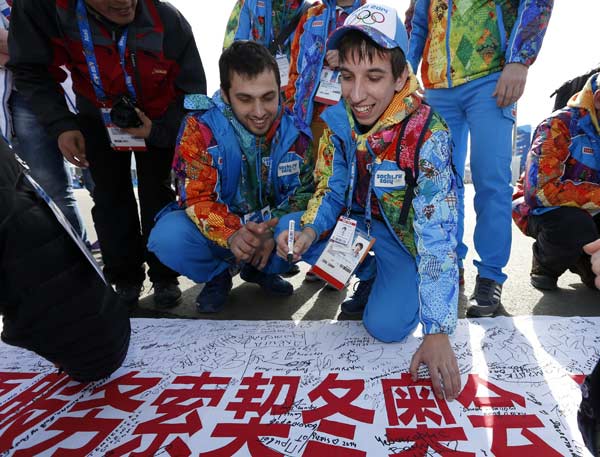 Volunteers sign a banner at the Winter Olympics in Sochi, Russia, to support Beijing's bid to host the 2022 Winter Olympics. Wang Lili / Xinhua |
The scale of volunteer work is growing across Asia, and proving highly beneficial for the region, as Alfred Romann and Kristine Yang report from Hong Kong.
On Jan 17, 1995, one of the most destructive earthquakes in history hit the city of Kobe in southeastern Japan. Around 6,500 people died and thousands of buildings were destroyed.
By the end of that year, 1.3 million volunteers had stepped up to help, overcoming a bureaucracy that was stalled by turf wars and stuck in regulatory details. One researcher, Borantia Gannen, called 1995 "year one of the volunteer age" and claimed that a volunteer revolution had begun.
Sixteen years later, on March 11, 2011, a massive earthquake and tsunami hit northeastern Japan. Almost every local and national government, as well as quasi-governmental organizations, arranged for volunteer groups to supplement, complement and facilitate the recovery and reconstruction operations.
Disaster volunteer centers were set up across the country, and nongovernmental organizations were up and running within days, said Simon Avenell, an associate professor of history at Australia National University, in a paper last year.
Volunteering has emerged as a powerful social force in Asia. Individual volunteers make it possible to undertake both large and small tasks by leveraging and institutionalizing the individual efforts of people both at home and abroad. In the last decade or so, the understanding and use of volunteerism in Asia has grown rapidly.
"We have seen an increase in volunteering in general, to all regions, including Asia. Our volunteering programs are some of the most highly trafficked on the site, outperforming studying abroad and teaching abroad," said Anis Salvesen, a director at Go Overseas, an online directory that provides reviews of volunteer programs around the world.
"Along the lines of impact, we have seen a growing interest in volunteer teaching abroad and conservation volunteering - one to change the future of the country and the other to preserve its rich natural past," said Salvesen. "Volunteers, based on their reviews and interviews, are definitely more interested in the impact of their programs than they once were."
Greater professionalism
According to Avenell, in the 16 years between the two massively destructive events in Japan, integration and collaboration between civic groups, businesses and the government expanded; funding for volunteers became more widely available; volunteer groups became more professional, while institutions to deal with willing candidates were established.
In the wake of the Kobe earthquake, volunteers "became the non-governmental backbone for Japan's disaster volunteering infrastructure," Avenell said.
It is not just in Japan that volunteers have emerged as a key social force. Their importance is visible across the region in events large and small.
In its first report on the state of volunteerism around the world in 2011, the UN noted that "an ethic of volunteerism exists in every society in the world, albeit in different forms".
"There is no agreed methodology for measuring the extent of voluntary engagement. However, most studies attest to the universality of volunteerism, its universal spread, massive scale and impact," the UN said
In a pair of surveys in Hong Kong from 2001 and 2009, the Agency for Volunteer Service and the University of Hong Kong found that the percentage of people who volunteered their time (from among those surveyed) rose from 22 percent to 35 percent.
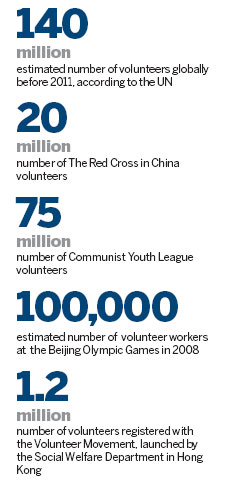
At the end of 2013, 2,507 organizations used volunteers in Hong Kong, and 1.2 million volunteers registered with the Volunteer Movement launched by the Social Welfare Department in 1998.
In Taiwan, as of 2010, more than 723,000 volunteers were working with 15,000 groups.
Elsewhere in Asia, volunteerism is becoming increasingly important to address social needs.
Bangladesh has created a National Volunteering Agency to plan, guide and manage volunteer activities. It has found that more than 16.5 million people volunteered in 2010 and contributed around $1.66 billion to the national economy - roughly 1.7 percent of the country's GDP.
There is a need, however, for volunteerism to be institutionalized and to bring global resources to bear on local settings.
Organizations that can reach out to prospective volunteers can partner with domestic groups to understand local needs while guaranteeing best practices.
However, the debate is growing about whether short-term volunteer efforts - for example, those who spend two weeks helping to build houses in an underdeveloped location - actually help.
On the Chinese mainland, volunteers played a key role in the recovery effort after the massive earthquake that devastated Wenchuan county, Sichuan province, in May 2008. The earthquake left about 4.8 million people homeless.
By one count, more than 100,000 volunteers, groups and NGOs stepped up, some more effectively than others. Although volunteers arrived with good intentions, there were reports of some helpers actually hindering the wider recovery efforts because their work was uncoordinated.
A powerful force
When carefully managed, however, large numbers of volunteers can prove to be a powerful force.
This was visible in another area in which China has used volunteers en masse: Events. For the Beijing Olympic Games, for example, organizers trained as many as 1.7 million people to assist with everything from attending to tourists to handing out medals.
About 100,000 of them were volunteers chosen from more than 1 million applications.
China's registered government-organized NGOs, such as the Red Cross and the Communist Youth League, have tens of millions of members. The Red Cross has as many as 20 million members while the CYL has 75 million across the country, according to the NGO Research Center at Tsinghua University in Beijing.
The scale of volunteering is varied and there are many ways for people to contribute. One company in India organizes candidates to teach English by telephone.
Such "virtual volunteering" has emerged as a growing movement, with people performing tasks such as proofreading or online fundraising. The UN also has an online volunteering site.
Traveling volunteers, or "voluntourists", are also becoming increasingly visible around the region. Thailand, for example, has launched a campaign to attract more interest from voluntourists.
Organizations in North America and Europe often partner with local groups to provide short- and long-term volunteers, sometimes choosing to help at home rather than traveling to lend a hand. Cambodia has also taken steps to attract more volunteers.
One key driver of volunteerism is the evolution of corporate social responsibility initiatives across Asia, although CSR varies drastically from country to country.
In some places it is entrenched in business, even if not always reported as such. In others, it is growing on the tail of globalization.
Corporate efforts rising
Corporate efforts are also on the rise, thanks to the growing importance of CSR campaigns driven by corporate governance requirements across Asia and the efforts of employees to participate in their communities.
But a larger number of volunteers does not necessarily translate into a greater impact, particularly when it comes to corporate volunteer programs.
Robin Bishop, director for CSR at Hong Kong's Community Business, said the growth in employee volunteers has been visible, while companies are looking to set up programs that use their available skills to help society.
"The impact is where there is still work to be done," said Bishop. "In Hong Kong, and to be honest, globally, there is a focus on output. How many volunteers gave how many hours? That demonstrates the level of commitment (but) doesn't demonstrate the result of the investment."
There is no easy way to quantify the global impact of the volunteers. More than three years ago, the UN counted as many as 140 million volunteers globally, roughly equivalent to the population of Russia.
Last year, Singapore's National Volunteer & Philanthropy Centre found that volunteer participation had hit record highs.
The center carries out a biannual survey. In 2013, it found that 32.3 percent participated in volunteer activities, compared with 23.3 percent in 2010.
One of the main reasons for the increase was the growing popularity of informal volunteerism. In 2000, only 9.3 percent of respondents volunteered their time.
Among them is Edmund Wee, honorary secretary of the Society for the Promotion of ADHD Research and Knowledge. Once a week for the last 14 years, Wee has met with parents in Singapore whose children have attention deficit hyperactivity disorder.
The group has stayed active all this time thanks to Wee and a small core of volunteers. Wee, a publisher, and the society are good examples of the impact that a small group of dedicated volunteers can have. The group holds regular support meetings and promotes awareness.
"I had a son who had ADHD and we were struggling to cope with him, and he was struggling to cope with his schoolwork," said Wee. "Over the years, we have had some success in pushing for teacher training in this area and for understanding the condition, but it is still below the understanding and help that autism and dyslexia get in Singapore."
However, Wee believes that volunteering in Asia is driven by the grassroots rather than by business or political leaders.
"I think there are quite a lot of people doing it," Wee said, but "we don't see any great leadership from famous people."
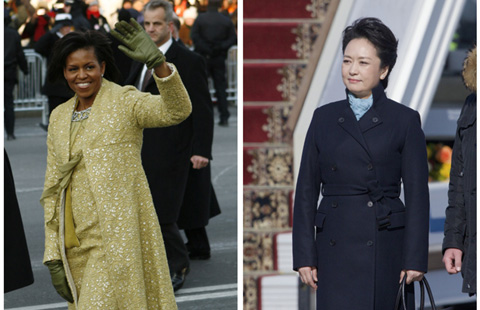
 Fashions of the first ladies
Fashions of the first ladies
 Pro-Russian forces take over Ukraine's naval HQ
Pro-Russian forces take over Ukraine's naval HQ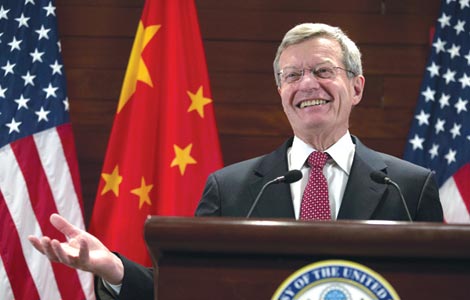
 New US envoy hits ground running
New US envoy hits ground running
 HK cellist to perform at Carnegie Hall
HK cellist to perform at Carnegie Hall
 Skyscrapers in E China resemble LV check pattern
Skyscrapers in E China resemble LV check pattern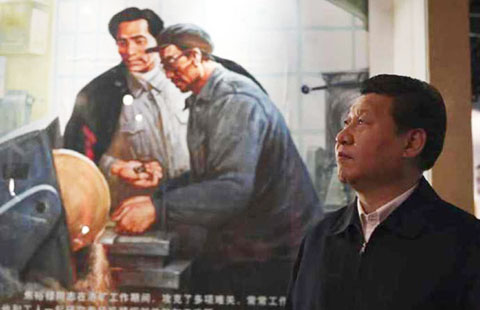
 President Xi honors memory of devoted county Party chief
President Xi honors memory of devoted county Party chief
 More than just food
More than just food
 Miss world visits cancer children in Colombia
Miss world visits cancer children in Colombia
Most Viewed
Editor's Picks

|

|

|

|

|

|
Today's Top News
Australia finds objects possibly from MH370
Tour adds 'new dimension' to ties
China largest holder of US debt
California shelves proposal
Chinese treasures on the block
China must expand inbound tourism
Hunger strike off, anger remains
Tourists offered compensation for bad air days
US Weekly

|

|







